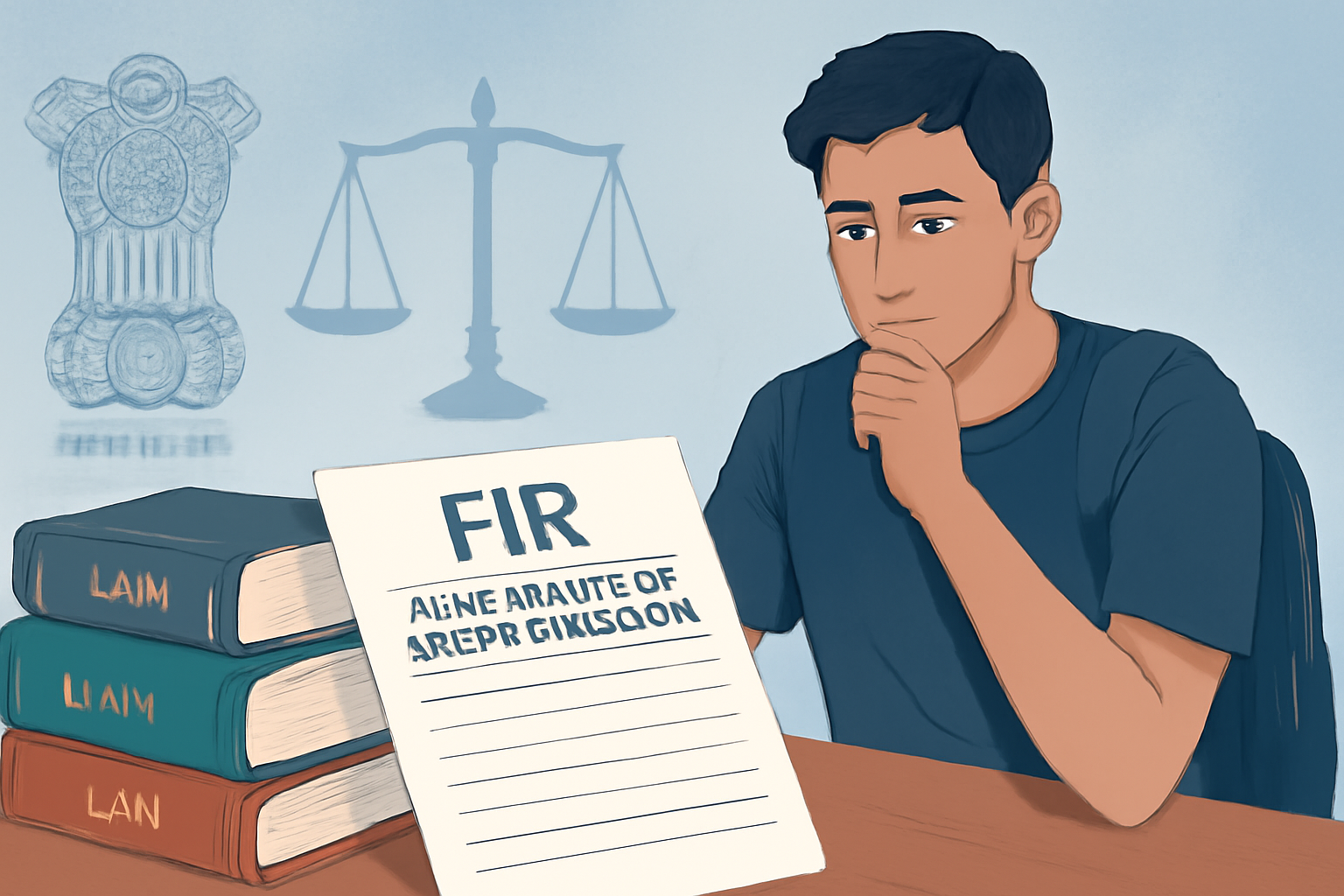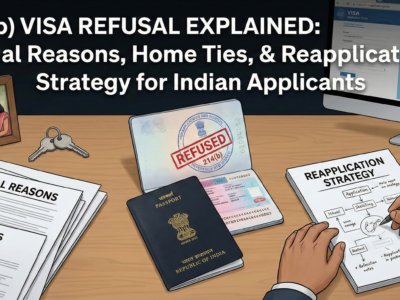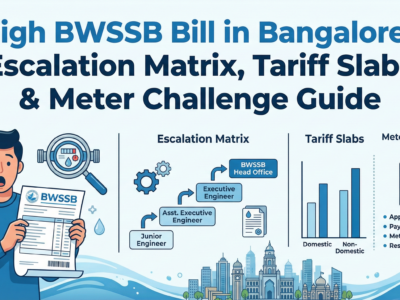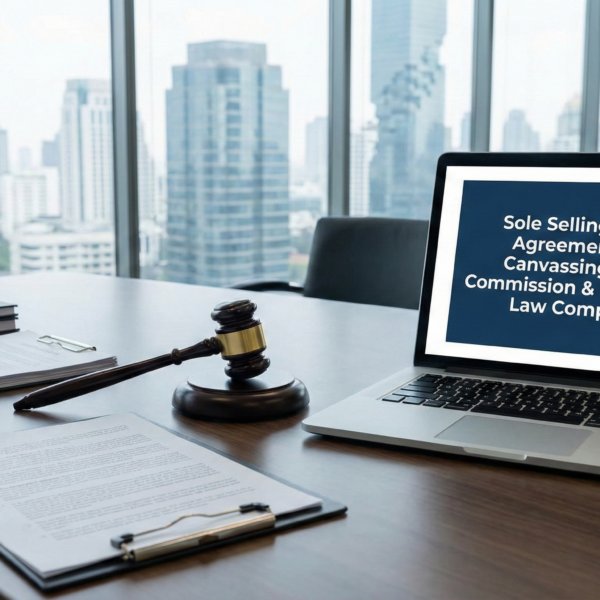Facing demands for “physical favors” or threats from a supervisor is an appalling abuse of power and a violation of your rights. The fear of academic retaliation is real, but you are not powerless. The Indian legal system provides a robust, dual-pathway approach to hold perpetrators accountable and protect your future. This comprehensive guide provides a step-by-step strategy, explaining your rights under the POSH Act and the Indian Penal Code, how to navigate the Internal Complaints Committee (ICC), and when to file an FIR. Here is how you can take control of the situation.
A Strategic Guide to Addressing Sexual Harassment in Indian Higher Education
Understand your rights and learn the step-by-step legal pathways to seek justice and ensure your academic future is protected. You are not alone.
What is your immediate concern?
Understanding Your Fundamental Rights
The situation described is a profound violation of fundamental rights guaranteed by the Constitution of India. Sexual harassment directly infringes upon these rights, and the Indian legal framework provides robust mechanisms for redressal.
Article 14
Guarantees the right to equality before the law.
Article 15
Prohibits discrimination on grounds of religion, race, caste, sex, or place of birth.
Article 21
Protects the right to life and the right to live with personal dignity.
A Dual-Pathway Approach to Justice
The law offers two distinct but parallel pathways to seek justice. These are not mutually exclusive and can be pursued at the same time for a more effective strategy.
1. The Institutional Pathway
POSH Act & UGC Regulations
- Utilizes the Internal Complaints Committee (ICC).
- Faster, with a 90-day inquiry timeline.
- Provides immediate academic relief.
- Confidential process.
- Outcomes: Disciplinary action, compensation.
2. The Criminal Justice Pathway
Indian Penal Code (IPC)
- Initiated by filing a First Information Report (FIR).
- Treats harassment as a crime against the state.
- Slower, more adversarial process.
- Proceedings can be public.
- Outcomes: Potential for imprisonment, fine.
Section 1: The Institutional Pathway (ICC)
The Internal Complaints Committee (ICC)
Every Higher Educational Institution (HEI) in India is legally mandated to have an ICC. This is a quasi-judicial body designed to be fair, impartial, and sensitive.
The Strategic Composition of the ICC
The ICC's structure is legally defined to ensure fairness and counteract power imbalances.
Strategic Documentation & Filing the Complaint
A detailed record is powerful evidence. Document every incident using the "5W 1H" method. The formal complaint to the ICC must be in writing and filed within **three months** of the last incident.
Navigating the ICC Inquiry: A 90-Day Timeline
The POSH Act mandates a strict, time-bound process to ensure a swift inquiry and prevent undue delays.
Securing Immediate Protection: Interim Measures
While the inquiry is pending, you can request immediate relief to ensure your safety and academic well-being. These are critical to sever the perpetrator's power over you.
Change of Supervisor
Academic Leave
Restrain Supervisor
Restrict Campus Access
Section 2: The Criminal Justice Pathway (IPC)
The supervisor's conduct constitutes several cognizable criminal offenses under the Indian Penal Code. This pathway treats his actions not just as misconduct, but as crimes against the state.
| Supervisor's Action | Applicable IPC Section | Punishment |
|---|---|---|
| Pressuring for intimacy / sexual favours | Section 354A: Sexual Harassment | Up to 3 years imprisonment + fine |
| Threatening academic/professional future | Section 506: Criminal Intimidation | Up to 2 years imprisonment + fine |
| Repeated advances / unwanted contact | Section 354D: Stalking | Up to 3 years imprisonment + fine |
| Insulting modesty with words/gestures | Section 509: Insulting Modesty | Up to 3 years imprisonment + fine |
The First Information Report (FIR) Process
How to File an FIR and What to Do If Police Refuse
File a "Zero FIR"
You can file at ANY police station. They are legally obligated to register it and transfer the case.
If Police Refuse...
Send a written complaint by registered post to the Superintendent of Police (SP).
If SP Fails to Act...
File a private complaint before the local Judicial Magistrate, who can order the police to register the FIR.
Section 3: Strategic Considerations
Institutional vs. Criminal Route: A Comparative Analysis
Each pathway offers distinct advantages and disadvantages. Pursuing both simultaneously often creates the most pressure for accountability.
ICC Pathway
Pros: Faster (90 days), confidential, provides immediate academic relief.
Cons: Punishment limited to employment action, internal process.
Criminal (FIR) Pathway
Pros: Potential for imprisonment, state investigation, creates public record.
Cons: Slower process, can be public, higher burden of proof.
Confronting the Fear of Retaliation
Your fear is valid, but the law is on your side. Filing a complaint is a "protected activity" and any form of retaliation or "victimisation" is a separate, punishable offense under UGC regulations. It is crucial to document any retaliatory actions and report them to the ICC immediately.
Section 4: Building a Support Network
You do not have to face this alone. There are several organizations in West Bengal, particularly Kolkata, that provide free legal, advisory, and emotional support.
Legal and Advisory Support
- West Bengal Legal Services Authority (WBSLSA): Government body providing free legal services to women.
- Socio Legal Information Centre (SLIC) - West Bengal: Prominent NGO in Kolkata offering pro-bono legal aid.
- NUJS Legal Aid Society: Free legal advice and counseling from a top law school.
Emotional and NGO Support
- Swayam, Kolkata: Leading feminist organization providing crisis counseling and support.
- RACSHA, Kolkata: A network of lawyers and psychologists offering therapeutic support.
Section 5: Mastering Your Evidence
In any proceeding, evidence is paramount. A well-documented case is significantly stronger. The burden of proof in an ICC inquiry is based on the "preponderance of probabilities," which is less strict than the "beyond a reasonable doubt" standard in criminal court, but meticulous records are still vital.
Digital Evidence: Your Silent Witness
- Emails & Texts: Save everything. Take screenshots and back them up to a secure cloud service (e.g., Google Drive, Dropbox). Ensure the date, time, and sender/receiver details are clearly visible.
- Social Media: Screenshot any inappropriate posts, messages, or comments. Do not engage, just document.
- Audio/Video Recordings: Be aware of laws regarding consent for recording conversations in India. While recordings can be powerful, consult with a lawyer on their admissibility and legality before relying on them.
Documenting Interactions
- Personal Journal: After every incident, immediately write down what happened. Note the date, time, location, what was said or done, and who else was present. Be factual and detailed.
- Witnesses: Identify anyone who may have witnessed the harassment, even if they only saw a small part. Note their names and what they might have observed. Their testimony can corroborate your account.
Section 6: The UGC and Institutional Responsibility
The University Grants Commission (UGC) Regulations, 2015, are not just guidelines; they are legally binding. These regulations place a heavy responsibility on the Higher Educational Institution (HEI) to create a safe, harassment-free environment. Knowing these duties empowers you to hold your institution accountable if they fail to act appropriately.
Promote Awareness
The university MUST conduct regular awareness programs, workshops, and prominently display information about the POSH policy and the ICC's members.
Provide a Safe Environment
This includes ensuring safety in labs, libraries, hostels, and transportation. Failure to do so is a breach of their duty.
Act on ICC Recommendations
The institution's head is required to act on the ICC's report within 60 days. They cannot ignore or arbitrarily reject the findings.
Assist the Complainant
The university has a duty to provide assistance to the complainant if they choose to file a criminal complaint (FIR).
Penalties for Non-Compliance
If an institution fails to comply with the law, the UGC can withdraw its funding, grants, and even its recognition or affiliation.
Section 7: Prioritizing Your Mental Health
Facing harassment and a subsequent legal battle is emotionally and psychologically draining. Your well-being is a priority. Taking proactive steps to manage your mental health is not a sign of weakness; it is a critical part of your strategy for justice.
Seek Therapy
A trauma-informed therapist can provide you with coping mechanisms and a safe space to process your experience.
Confide in a Trusted Circle
Share your burden with a few close friends or family members who you know will be supportive, not judgmental.
Set Boundaries
It's okay to disconnect from social media, avoid certain people, and say "no" to protect your emotional energy.
Practice Self-Compassion
Remind yourself that this is not your fault. Allow yourself to feel your emotions without judgment. You are resilient.
Section 8: Frequently Asked Questions
The law anticipates this. If the complaint is against the head of the institution or a senior executive, the complaint is filed with the Local Complaints Committee (LCC), a district-level body. For other senior officials like a HoD, the ICC still has jurisdiction. The external member's presence on the ICC is specifically designed to counteract internal power dynamics and ensure impartiality.
Under the POSH Act, anonymous complaints are generally not permissible as the respondent has a right to know their accuser and respond to the allegations. However, institutional policies may allow for initial reporting of concerns anonymously to trigger a broader inquiry. For a formal proceeding against an individual, you must identify yourself. Confidentiality of your identity throughout the ICC process is, however, strictly mandated by law.
The ICC has the power to extend the timeline by another three months if it is satisfied that the circumstances (such as illness, trauma, or other valid reasons) prevented you from filing within the initial period. You must provide a reason for the delay in writing. Importantly, the criminal justice pathway (filing an FIR) has a longer statute of limitations (typically up to 3 years for these offenses), so that option remains open.
Yes, you can request to withdraw your complaint in writing. However, the ICC is not obligated to terminate the inquiry. If they believe the matter is serious and affects the safety of the wider campus community, they can choose to proceed with the inquiry "in-rem" (against the act itself) even without your active participation, based on the evidence already submitted. This is to prevent complainants from being pressured into withdrawing complaints.
Section 9: The Legal Bedrock - From Vishaka to POSH Act
The POSH Act of 2013 did not emerge in a vacuum. It is the culmination of a long and arduous struggle for women's rights, spearheaded by the landmark Supreme Court judgment in Vishaka and others vs. State of Rajasthan (1997). This case, born from a horrific gang rape of a social worker, established the foundational legal framework—the "Vishaka Guidelines"—making it the employer's/institution's responsibility to prevent and redress sexual harassment. The POSH Act later codified and expanded upon these guidelines, giving them legislative power.
Why This Matters For You
Understanding this history is a strategic tool. It confirms that your right to a safe academic environment is not a recent development but a constitutionally-grounded principle affirmed by the Supreme Court for decades. When you file a complaint, you are not just invoking a university policy; you are standing on a foundation of constitutional law built to protect your dignity and equality.
Section 10: Advanced Strategies - The Appeals Process
What happens if you are dissatisfied with the ICC's final report or the action taken by the university? The law provides a clear pathway for appeal. You are not at a dead end.
Escalating Your Case: The 90-Day Appeal Window
If the ICC's findings are unjust, or if the university fails to act on the recommendations, you have the right to appeal within 90 days of the recommendation.
Unfavorable ICC Report or Inaction by Institution
This includes findings that are not in your favour, recommendations you find inadequate, or the university simply ignoring the report.
File Appeal to State/Central Administrative Tribunal or Labour Court
The appeal is made to the relevant court or tribunal as per the institution's service rules. A lawyer can help you identify the correct forum and draft a strong appeal.
Section 11: The Invisible Battlefield - Psychology of Academic Harassment
The supervisor-student relationship is inherently asymmetrical. Understanding the psychological tactics at play can help demystify the abuser's behavior and validate your own feelings, which is crucial for building a strong case and for your personal recovery.
Abuse of Power & Coercion
The threat to "ruin your academic future" is a classic example of coercive control. The harasser leverages their institutional authority over your grades, thesis approval, and future recommendations to create a climate of fear and dependency.
Grooming & Boundary Violation
Harassment often starts subtly. The supervisor may begin with inappropriate personal questions, unwarranted praise, or meetings outside professional contexts ("meet me on weekends"). This is a grooming tactic designed to blur professional boundaries and test your tolerance for inappropriate behavior.
Gaslighting & Isolation
The harasser may try to make you doubt your own perceptions ("you're being too sensitive," "you misunderstood"). They may also attempt to isolate you from lab-mates and colleagues, making it harder for you to seek support or find witnesses.
Section 12: A Guide for Friends & Colleagues - The Bystander's Role
The initial report came from a friend. Supporters play a vital role. If you are a friend, lab-mate, or colleague of someone facing harassment, your actions can make a significant difference. Here’s how you can be an effective ally.
Do:
- Listen without Judgment: The first step is to believe them. Say "I believe you" and "This is not your fault."
- Help Document: Offer to be a repository for their evidence or help them organize their journal. Note down any incidents you personally witness, with date and time.
- Offer Practical Support: Accompany them to the ICC office, help them find a lawyer from the resources listed, or simply sit with them so they don't have to be alone on campus.
- Become a Witness: If you've seen or heard anything, offer to give a statement to the ICC. Corroborating evidence is incredibly powerful.
Don't:
- Don't Confront the Harasser: This can escalate the situation and put both you and the victim at risk. Leave the intervention to the official channels.
- Don't Spread Gossip: Confidentiality is crucial. Sharing details can undermine the formal complaint and is a breach of trust.
- Don't Pressure Them: The decision to report is deeply personal. Support their choices, whether they decide to file a complaint immediately or need time to consider their options.
Section 13: Case Study - The Path to Resolution
Fictionalized accounts based on real-world scenarios can illustrate how these legal principles work in practice. Here is an example.
"Anjali," a PhD Scholar vs. a Senior Professor
The Situation: Anjali's guide began making inappropriate late-night calls and insisted on discussing her thesis at his home. When she refused, her progress reports were repeatedly rejected without clear academic justification.
Her Actions:
- She started a log, noting the time and content of each call. She saved call logs and screenshots of messages.
- She confided in a friend (a fellow student) who had witnessed the professor's overly familiar behavior in the lab.
- She contacted an NGO from her university's resource list, who gave her a free legal consultation.
- She filed a formal complaint with the ICC, attaching her log and a list of potential witnesses. In her complaint, she immediately requested an interim measure: a change of supervisor.
The Outcome:
- The ICC granted the interim measure within 10 days, assigning her a new, neutral supervisor to ensure her academic work could continue without prejudice.
- The inquiry proceeded. Her friend's testimony corroborated the pattern of unprofessional behavior.
- The ICC found the professor guilty of harassment. He was barred from supervising students for five years and a formal warning was placed in his service record. The university also issued a formal apology to Anjali.
Section 15: Your First Information Report (FIR) Template
Filing an FIR is a significant step. While it is highly recommended to do this with a lawyer, you have the right to file it yourself. This template provides a structured format to ensure your complaint is clear, comprehensive, and legally robust. Present this in writing to the Officer In-Charge of the police station.
Draft Complaint for Registering an FIR under Section 154, Cr.P.C.
To,
The Officer In-Charge,
[Name of Police Station]
[Address of Police Station]
Kolkata, West Bengal
Date: August 30, 2025
Subject: Complaint against [Supervisor’s Full Name] for sexual harassment, criminal intimidation, and stalking under Sections 354A, 354D, 506, and 509 of the Indian Penal Code, 1860.
Respected Sir/Madam,
I, [Your Friend's Full Name], daughter of [Father's Name], aged [Your Age], residing at [Your Full Address], am a PhD scholar in the Department of [Your Department] at [Name of Institution], [Address of Institution]. I am writing to formally report a series of cognizable offenses committed against me by my academic supervisor, Professor [Supervisor’s Full Name], whose office is located at [Supervisor's Office Address/Department].
The facts of the matter are as follows:
- Background: I have been working under the supervision of Prof. [Supervisor's Last Name] for my PhD research since [Date of Joining]. For the majority of this period, our interactions were professional. However, the harassment began around [Date/Month when harassment started].
- First Incident (Sexual Harassment - Sec 354A IPC): On or around [Date of first major incident], Prof. [Supervisor's Last Name] called me to his office and, under the pretext of discussing my research, made unwelcome sexual advances. He stated [Quote the inappropriate words as accurately as possible, e.g., "that if I wanted to finish my PhD on time, I should be more 'cooperative' and 'intimate' with him"]. I was shocked and firmly refused his advances.
-
Pattern of Harassment and Stalking (Sec 354A, 354D IPC): Since my refusal, Prof. [Supervisor's Last Name] has engaged in a relentless campaign of harassment. This includes:
- Repeated and unsolicited phone calls and text messages at odd hours. (A log of these calls/messages is attached as Annexure A).
- Pressuring me to meet him alone on weekends and outside campus, which I have always refused. For example, on [Date], he called me and asked me to meet him at [Location].
- Making sexually coloured remarks and insulting my modesty (Sec 509 IPC) during lab meetings. On [Date], in front of [Witness Name, if any], he said [Quote the remark].
- Criminal Intimidation (Sec 506 IPC): Following my continued refusals, Prof. [Supervisor's Last Name] has started threatening my academic and professional career. On [Most recent date of threat], he explicitly told me, "If you tell anyone about this, I will make sure you never get your PhD. I will ruin your name in the academic community." This has caused me immense fear and mental anguish, making me terrified to even enter my own laboratory.
The actions of Professor [Supervisor's Full Name] constitute clear criminal offenses under the Indian Penal Code, including but not limited to sexual harassment (S.354A), stalking (S.354D), criminal intimidation (S.506), and insulting the modesty of a woman (S.509).
I therefore request you to register this complaint as a First Information Report (FIR) under the relevant sections of the law and to initiate a thorough investigation into this matter. I am prepared to provide my full cooperation and submit all evidence in my possession.
Thank you for your prompt attention to this grave matter.
Sincerely,
[Your Friend's Signature]
[Your Friend's Full Name]
[Your Phone Number]
[Your Email Address]
Enclosures:
- Annexure A: Log of calls and screenshots of messages.
- Copy of my Student ID card.
Section 16: A Roadmap to Justice
The situation is distressing, but not without a solution. You are protected by a multi-layered legal framework designed to address such abuses of power. The path forward requires courage, but you have the full weight of the law on your side.
Document Everything
Start a detailed, private log of every incident and preserve all digital evidence (emails, texts, etc.).
Seek Support
Contact a legal aid group or NGO like SLIC or Swayam in Kolkata for expert guidance and counseling.
File an ICC Complaint
Submit a written complaint to the university's ICC and explicitly request immediate interim relief, like a change of supervisor.
File an FIR
Use the provided template to file a strong FIR with the local police to initiate parallel criminal proceedings.










